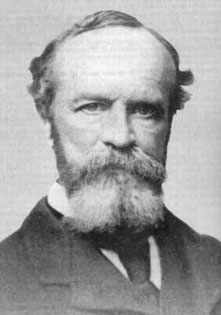"Free will. It's like butterfly wings: once touched, they never get off the ground."
John Milton (1608 - 1674)
| Did you know that a butterfly in Ontario can cause a hurricane in Japan? It's true! Chaos theory, part of which is sometimes called the Butterfly Effect, states that an action can have an effect that is almost impossible to predict. Think of it this way: when you throw a pebble in a pond, do you ever pause to calculate what could happen to the fish? |
 Thought ExperimentImagine you are sitting in a plane, flying over Alberta. Being bored encourages you to rummage around through your seat's magazines when, surprisingly, you pick up a small magazine called, "Your Life" featuring a picture of you, reading the magazine, on the front cover!
Thought ExperimentImagine you are sitting in a plane, flying over Alberta. Being bored encourages you to rummage around through your seat's magazines when, surprisingly, you pick up a small magazine called, "Your Life" featuring a picture of you, reading the magazine, on the front cover!Intrigued, you begin flipping through the magazine, shocked to discover it describes every aspect of your life. Curious (and a little worried) you flip to the back only to discover a blank page with only the little letters RIP in the centre. Skipping back a page you nervously read about how your "life ended tragically after the plane you were flying on crashed just over Alberta..."!
Unable to read any more you propel yourself out of your seat and crash into the cockpit screaming that "I'm going to die! Land the plane!" Unfortunately, the startled pilot sends the plane spiralling out of control...
As the debris drifts down, a solitary page remains: "...after you startled the pilot by rushing into the cockpit."
What does this situation tell you about free will? What would it mean if such an event occurred?
1. Free Will?
Are your choices your own?
This question has plagued philosophers for centuries. After all, the answer stretches as far as the meaning of life, but also impacts everything from friendships to criminals. Some interesting questions to be pondered include;
Can society justify putting prisoners in jail if they had no choice but to commit the crime? Do your accomplishments matter if they were predetermined?
Can society justify putting prisoners in jail if they had no choice but to commit the crime? Do your accomplishments matter if they were predetermined?
 Do your accomplishments matter if they were predetermined?
Do your accomplishments matter if they were predetermined?This issue is a great example for why semantics (the meaning of words) matter in philosophy. After all, sometimes you might feel as though you have no choice, but this isn't really true is it? After all, you could choose to do nothing or to resist. The outcome might not be what you want it to be, but you still technically have a choice (but not necessarily a chance). A choice, then, is something you decide to do, but not necessarily something you do accomplish.
| Free will can be defined as the ability to make conscious choices that determine one's future. Assuming such things exist, free will permits you to have control over the physical, mental and spiritual realms. In reference to Descartes declaration 'cogito ergo sum', you are an independent thinking thing. After all, if the thoughts were not your own, how could you exist? As an analogy, consider free will as a road with many paths that you are free to walk. |
Determinism is the opposite of free will. As the name suggests, your choices are already determined and there is nothing you can do to change the past, present or future. As an analogy, consider determinism as being a cog in a giant machine. However, determinism's cause is still up for debate. The three main 'choices' are:
| Type | Definition | Problem |
|---|---|---|
| Causal | Cause and effect relationships invariably lead from one to the other. | Where does the first cause come from? |
| Theological | God determines the future, whether through design or omniscience. | Does God not have the power to allow free will? And if so, how can things occur that God cannot know? |
| Biological | Everything living creatures do is a direct result of their genetic programming. | Humans are now able to change their genetic structure. |
Laplace's Demon
 In his 1814 work Essai, Philosopher Pierre-Simon Laplace proposed a Newtonian-based thought experiment whereby a demon could know the location and speed of every atom in the universe (something quantum physics suggests is impossible). Using cause and effect, this demon would know everything, thereby suggesting that free will is an illusion born from complexity; that is, you believe in free will because the universe is so complex, that it is impossible to perceive it in its entirety.
In his 1814 work Essai, Philosopher Pierre-Simon Laplace proposed a Newtonian-based thought experiment whereby a demon could know the location and speed of every atom in the universe (something quantum physics suggests is impossible). Using cause and effect, this demon would know everything, thereby suggesting that free will is an illusion born from complexity; that is, you believe in free will because the universe is so complex, that it is impossible to perceive it in its entirety.| To quote Laplace: "We may regard the present state of the universe as the effect of its past and the cause of its future. An intellect which at a certain moment would know all forces that set nature in motion, and all positions of all items of which nature is composed, if this intellect were also vast enough to submit these data to analysis, it would embrace in a single formula the movements of the greatest bodies of the universe and those of the tiniest atom; for such an intellect nothing would be uncertain and the future just like the past would be present before its eyes." The Thwarting of Laplace's Demon: Arguments Against the Mechanistic World-View by Richard Green. Vhps Distribution, 1995. |
Compatibilism
 |
| William James |
Compatibilism attempts to blend free will and determinism. Basically, you get a small amount of options in an essentially determined universe. As an analogy, image your parents decide you are going out for ice cream, but you get to pick your flavour. Another, more eastern philosophical, take on compatibilism is that you are a part of the universe, trying to understand itself.
| Although many famous philosophers including Hobbes and Hume have argued for compatibilism, William James' The Dilemma of Determinism offers a succinct spin on the debate. James believed that hope and optimism were reasons to believe in compatibilism, since determinism's trappings were bleak and pessimistic. What do you think? Click here to read the essay in its entirety. |
 Did You Know?Worried that free will doesn't exist? Well, perhaps it's quantum physicists to the rescue! Werner Karl Heisenberg's Uncertainty Principle describes how it is impossible to measure an electron's position and velocity at the same time. The observer effect, too, argues that the very act of trying to observe something so small changes the outcome; so, you can either know an electron's velocity or its position, but not both since observing changes one or the other.
Did You Know?Worried that free will doesn't exist? Well, perhaps it's quantum physicists to the rescue! Werner Karl Heisenberg's Uncertainty Principle describes how it is impossible to measure an electron's position and velocity at the same time. The observer effect, too, argues that the very act of trying to observe something so small changes the outcome; so, you can either know an electron's velocity or its position, but not both since observing changes one or the other.Another chance for free will comes from the nature of space. Although things appear pretty stable up here in the macroscopic world, once you delve down into the quantum realm, things start to get, well, weird. Without turning this into a mathematics course, quantum physicists theorize that even the rules of cause and effect don't always apply! (In other words, Laplace's Demon would have a difficult time seeing the future since the act of seeing would change the future itself!)
If you are interested in learning more, click here to watch an online episode of Nova's The Elegant Universe. This is in 3 parts - the Nova Website only makes available one of the three parts at any given time - currently only Episode 3 is available - watch it, it's extremely interesting. Be forewarned though, this might force you to question your basic understanding of the universe (you don't have to watch it all, or watch it all at once).
 Resources
Resources
- Stanford Encyclopaedia of Philosophy Entry on Free Will
- The Determinism and Freedom Philosophy Website


No comments:
Post a Comment